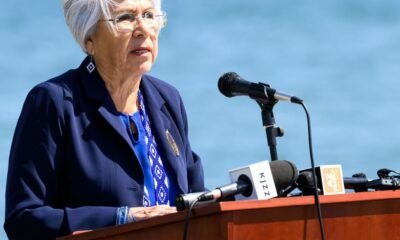Border Patrol
The Economic Fallout of Our Flawed Immigration Policies

By Dr. Thomas Patterson |
Milton Friedman, a prominent free-market economist, recognized the historical significance of immigration, noting that immigrants before 1914 generally sought better lives and succeeded. This influx benefitted the nations they adopted. However, Friedman emphasized a key distinction: the impact of unrestricted immigration to jobs versus immigration to welfare. He argued that immigrants reliant on public benefits do not contribute positively, instead creating a “uniform level” of dependency across society.
Today’s immigration landscape presents stark contrasts. The current wave of undocumented immigrants differs significantly from those of the past, particularly regarding their integration into the labor force. A recent analysis by the Atlanta Federal Reserve revealed that while over half of the new jobs in the last two years went to unauthorized immigrants, only about 50% of working-age non-college immigrants are participating in the labor market. In contrast, approximately 83% of native Americans aged 25 to 64 hold jobs.
During the Biden administration, the Border Patrol processed over 10 million illegal immigrants, with many more potentially evading detection. Despite this, foreign-born employment rose by only 2.32 million, raising questions about who is supporting the vast number of newcomers. The burden increasingly falls on American taxpayers.
California epitomizes the challenges associated with dependent illegal immigration. The state allocates significant funds—totaling approximately $22.8 billion in state and local taxes—to support these individuals, who generate only $8.5 billion in income. Many assistance programs are directly funded by federal taxes, meaning all Americans contribute to this rising expenditure, further strained by the efforts of NGOs aiming to provide for these new arrivals.
The ongoing impact on the federal budget has shifted the conversation surrounding immigration from whether undocumented immigrants should access public benefits to how these benefits will be allocated. Deportation, once a common response to failed asylum claims, is increasingly deemed unfeasible.
America’s welfare system remains an attraction for many. Adjusted for inflation, average benefits for working-age households surged from $7,352 in 1967 to $64,700 in 2022. Welfare now consumes over 72% of unobligated revenues, while defense spending has halved.
Moreover, the Census Bureau’s poverty statistics often fail to account for key forms of income, including transfer payments that assist the poor. As highlighted by Gramm and Arrington in the Wall Street Journal, these assumptions lead to a misleading picture of poverty in America. When considering all transfer payments as income, the majority of those classified as poor no longer fall into that category.
This abundance of welfare has contributed to a decline in employment among working-age individuals in the lowest income bracket, dropping from 68% to 38%. In contrast, those in the second lowest income quintile are 2.4 times more likely to secure employment and work significantly more hours on average.
It is essential to acknowledge that many welfare beneficiaries are not dishonest; rather, they are making rational choices in a flawed system. The United States finds itself deeply in debt, relying on future income that may not materialize. Current economic behavior suggests a reliance on a mirage of wealth.
Ultimately, the motivation behind ongoing immigration policies appears to be an effort to reshape the political dynamics of the nation. Ironically, the very migrants drawn by optimistic prospects may face disappointment when these promises can’t be realized. As Friedman warned, enriching others at the expense of our own prosperity leads only to collective impoverishment.
Dr. Thomas Patterson, former Chairman of the Goldwater Institute and a retired emergency physician, brings a wealth of experience as a former Arizona State senator and author of Arizona’s original charter schools bill.

















